The 24 amp electric car charger is a sought-after but uncommon device. It can supply your automobile with up to 5.8 kW and is powered by a 240 volt mains supply.
If you’re charging aт EV battery that holds 75kW of electricity, you’ll be able to fully charge it in 12 hours using this charger.
There are a variety of home charging stations for electric cars. These vary from Level-1, which can charge your car at different speeds depending on its battery power and need. All the way up through 40 Amp high power (HP) EV chargers that take about four hours to fill up an EV with a 75 kW battery.
What kind of 24-amp EV charger do you need for your electric car? There are many types and they all have their pros.
Portable & travel 24-amp chargers
Charging stations 24-amp and up
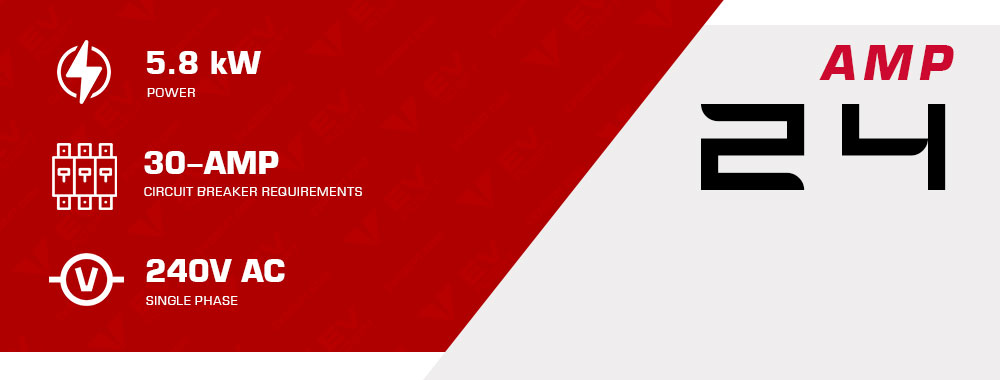
24A portable chargers
A portable charge might be the right choice if traveling often, but a plug-in type will offer more stability while plugged into an outlet at home or work (and it doesn’t require any installation).
A 24-amp portable EV charger can charge your electric car much faster than Level-1 chargers. The compact size of the charger will allow you to take it with you when you go places. You can also keep it in your car or in your house. It doesn’t take up a lot of space.
24-amp chargers, which are equivalent to 5 kilowatts, can charge a fully charged, medium-capacity car battery in just 13 hours. In just one hour, the 24 amp chargers can charge an electric car for approximately 25 miles. This charger is 3.5x more efficient than Level-1 chargers. They can be connected to 240 volts. The 24A units are compatible with NEMA 6-30, 10-30 or 14-30 outlets. They have a breaker capability of 30 amps or more. These devices are not often hardwired.
High power chargers compatible with 24A
There are charging stations with a range of 24 amps and higher that can handle the required power. Don’t worry, they’re also compatible with electric cars with different capacity limitations. Their main benefit is the potential for extra power if you upgrade to an electric vehicle in the future and need 40 amps rather than 24 amps.
Plugin EV charging stations
We have a few chargers for you! The NEMA 14-50 is a U.S. standard that can be found in residential properties, and it’s great if your device won’t draw more than 40 amps. Check out the full review of the NEMA 14-50 models here.
- Get a great dealFeb 24, 2026 6:15 PM
The following is a list of the best hardware chargers. We’ve compiled it from experienced customers’ purchases to provide you with as accurate a picture as possible!
Hardware chargers compatible with 24 amp
Hardwired types of devices are considered safe compared to plug-in models, which may not last as long and may not provide reliable performance in the future. You will have to do more complex steps to dismantle the unit if something goes wrong with it (e.g., hire an electrician who will charge extra).
Hardware models have a maximum power rating of more than 24 amps, but they adapt perfectly thanks to OCPP to your electric car, even if the EV has an incoming power limit. If you allow electric cars to be used in the future, it makes sense to invest in more powerful devices, such as 40-amp units.
- Best seller for 24A and upBosch Level 2 Hardwired EV Charging station (240 Volt, 18ft Cable, up to 32 Amp)$1,74900
- Get a great dealFeb 24, 2026 6:15 PM
- Get a great dealFeb 24, 2026 6:15 PM
Why is Level 2 EV charger better than Level 1? Level 2 uses 240-volt and provides less waiting time for charging.
What is the charging speed of popular models of electric cars with a 24-Amp charging station?
| Chevy Bolt | 20 mi/h |
| Ford Mustang Mach E | 14 mi/h |
| Hyunday Kona | 18 mi/h |
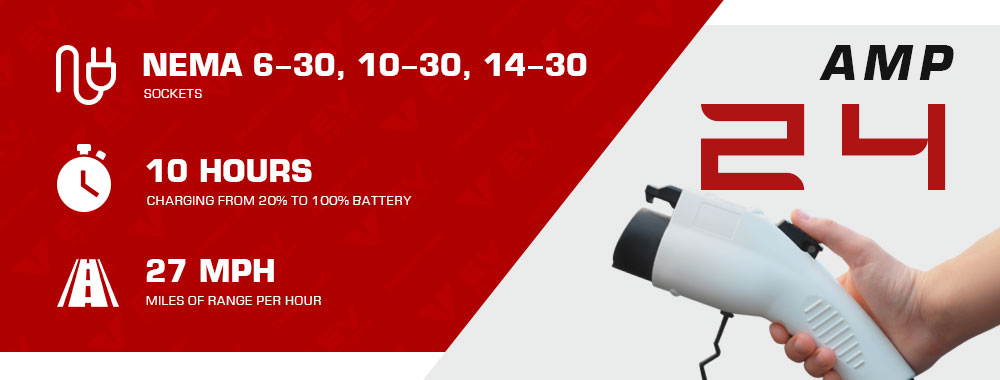
Comparison table for 24A portable chargers
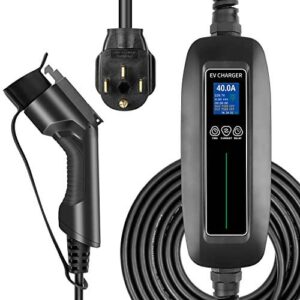 | 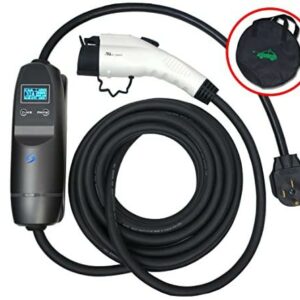 | 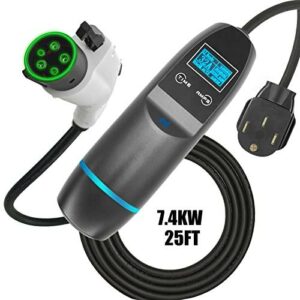 | 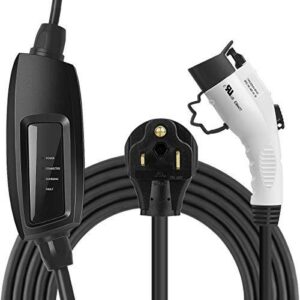 | 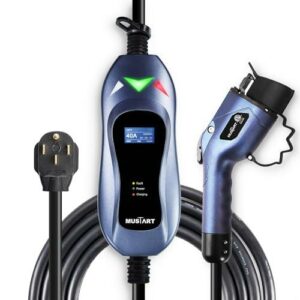 | |
| Elecvlife Level 2 Portable EV Charger 9.6 kW (240Volt, 25ft... | Inteset Level 2 Portable EV Charger 7.7 kW (240Volt, 25ft/7... | K.H.O.N.S. Level 2 Portable EV Charger 7.7 kW (240Volt, 16f... | POTATO Level 2 Portable EV Charger 7.7 kW (240Volt, 26ft/7m... | MUSTART TRAVELMASTER Level 1 and 2 Portable EV Charger (240... | |
| Overview | It can be used on different voltages with little effort. It comes with adaptors for connecting to various outlets. When traveling, it works as a Level 2 and Level 1 device. | ||||
| Brand | Elecvlife | Inteset | K.H.O.N.S. | POTATO | MUSTART |
| Amperage | 16, 24, 32, 40 | 12, 16, 24, 32 | 12, 16, 24, 32 | 10, 16, 20, 24, 32 | 16, 24, 32 |
| Voltage | 240 | 240 | 240 | 240 | 120, 240 |
| Cable length, ft | 25 | 25 | 16 | 26 | 25 |
| Socket | NEMA 14-50 | NEMA 14-50 | NEMA 14-50 | NEMA 6-50 | NEMA 14-50, NEMA 5-15, NEMA 5-20 |
| Waterproof | IP65 | IP65 | IP65 | IP54 | EV connector - Yes, Control Box - No |
| Weight | 10.93 | 11.77 | 9.17 | 9.94 | 11.88 |
| Working temperature | -22°F to 158°F | -20°F - 122F | -13°F - 122°F | -13F to 131F | n/a |
| Warranty | n/a | 2 years | n/a | 1 year | 2 years |
| Certificate | n/a | UL / CE | n/a | n/a | n/a |
When choosing a 24-amp EV charger, you should pay attention to the following criteria
– Amperage: The amperage of the charger is important to consider because it will determine how quickly your vehicle can charge.
– Cable length: The cable length is also important to consider because it will determine how far away from the charging station you can park your vehicle.
– Socket: The socket type is also important to consider because it will determine compatibility with your vehicle.
– Waterproof: The waterproofness of the charger is also important to consider because it will protect against weather damage.
– Weight: The weight of the charger is also important to consider because it will affect portability.
– Warranty: The warranty is also important to consider because it will determine the length of time the charger is covered.
– Certificate (UL): The certificate is also important to consider because it will verify that the charger meets safety standards.
Comparison chart for 24A plugin EV charging stations
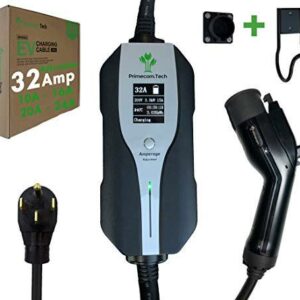 | 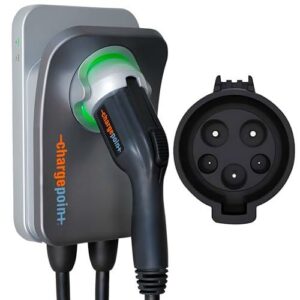 | 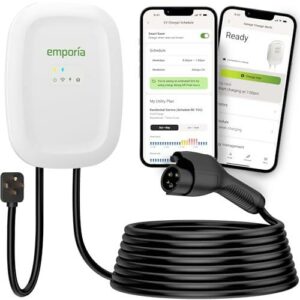 | 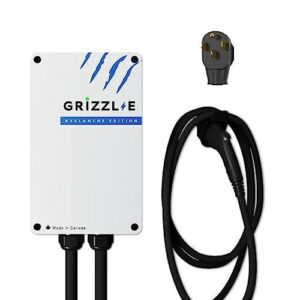 | |
| PRIMECOM Level 2 Portable EV Charger 7.7 kW (240Volt, 30ft/... | ChargePoint NEMA 6-50 plug Home Charging Station Level 2 (2... | Emporia Level 2 EV Charging Station (240 Volt, 24ft Cable,... | Grizzl-E Level 2 EV Charger NEMA 14-50 Plug, 24ft Cable, In... | |
| Overview | Charge Smarter, Not Just Faster. Safe and Reliable for Your Home and Your EV. Works with Any EV. Can be hardwired. | Hardwired connections are eligible up to 48 amps. | Fast charging and adjustable amperage. Heavy-duty EVSE which is suitable for any weather. UL Full Tested and Certified. | |
| Brand | PRIMECOM | chargepoint | Emporia | Grizzl-E |
| Amperage | 10, 16, 20, 24, 32 | 16, 24, 32, 40, 48, 50 | 16, 24, 32, 40, 48 | 16, 24, 32, 40 |
| Cable length, ft | 30 | 23 | 24 | 24 |
| Socket | NEMA 14-50 | NEMA 6-50 | NEMA 14-50 | NEMA 14-50 |
| Wall/Stand | Wall | Wall | Wall | |
| Waterproof | IP56 | Yes | Yes | Yes |
| Weight | 11.68 | 17.6 | 26.2 | 19.86 |
| Working temperature | n/a | -40°F to 122°F | -22°F to 122°F | -22°F to 122°F |
| Warranty | 1 year | 3 years | 3 years | 3 years |
| Certificate | CE️ | UL certificate 20190607-E328478 issued 06/07/2019; Type 3R per UL 50E; ENERGY STAR qualified 06/25/19. | EV Charger is not UL certified, it is manufactured to meet the safety criteria defined by these international standards: NEC 625, SAE J1772, UL 817, UL 991, UL 2231, UL 225, and UL 2594 | UL Full Tested and Certified |
| Wi-Fi | No | Yes | Yes | No |
So what’s the advantage of plug-in EV chargers over hardwired EV chargers?
Socket. Plug-in chargers are more versatile, as they can be used with any EV, regardless of make or model. Hardwired chargers, on the other hand, are specific to a certain make or model of EV and cannot be used with other vehicles.
Another advantage of plug-in chargers is that they are portable. If you need to move your EV to a different location, you can simply unplug the charger and take it with you. Hardwired chargers, on the other hand, are not as easily portable and must be installed by a professional electrician.
Finally, plug-in chargers are typically cheaper than hardwired chargers.
Comparison table for 24A-compatible hardwired EV charging stations
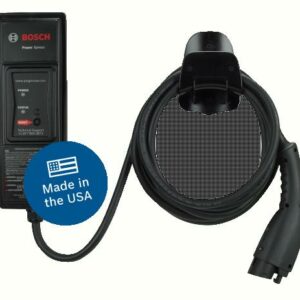 | 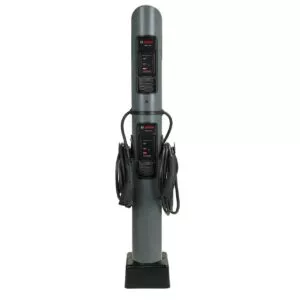 | 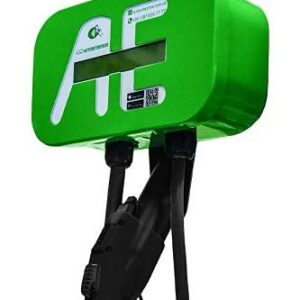 |  | 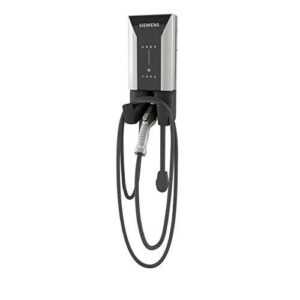 | |
| Bosch Level 2 Hardwired EV Charging station (240 Volt, 18ft... | Bosch Automotive Equipment Bosch EV800 EV Dual Charge Stati... | AUTO ENTERPRISE Level 2 EV Charging station 12 kW (240 Volt... | ChargePoint NEMA 14-50 plug/hardwired Home Charging Station... | Siemens VersiCharge Level 2 Hardwired EV Home Charging stat... | |
| Overview | The compact charger, despite its size, is not portable. Weatherproof design for any environment. | Industrial grade charger that is designed to withstand higher levels of moisture. | EVSE with IP65 protection class, IK10 mechanical protection. Charging speeds of up to 50 amps. | Charge Smarter, Not Just Faster. The Flexibility to Work with Any Home. Works with Any EV. Hardwired connections are eligible up to 50 amps. | A high-powered home device. Has high WiFi signal requirements. |
| Brand | Bosch | Bosch Automotive Equipment | AUTO ENTERPRISE | chargepoint | Siemens |
| Amperage | 12, 16, 24, 32 | 12, 16, 24, 32 | 12, 16, 24, 32, 40, 48, 50 | 16, 24, 32, 40, 48, 50 | 12, 16, 24, 32, 40, 48 |
| Voltage | 240 | 240 | 240 | 240 | 240 |
| Cable length, ft | 18 | 23 | 22 | 23 | 20 |
| Enclosure Material | Schedule 40 Galvanized Steel | Steel with anti-corrosion coating | |||
| Level | 2 | 2 | 2 | 2 | 2 |
| Wall/Stand | Wall | Stand | Wall | Wall | Wall |
| Waterproof | Yes | IP65 | Yes | ||
| Weight | 14 | 170 | 27 | 17.6 | 17 |
| Working temperature | -40°F to +122°F | -40°F to 122°F | n/a | -40°F to 113°F | |
| Warranty | 3 years | 3 years | n/a | 3 years | |
| Certificate | ETL certified to UL standards | n/a | UL certificate 20190607-E328478 issued 06/07/2019; Type 3R per UL 50E; ENERGY STAR qualified 06/25/19. | cUL listed | |
| Wi-Fi | No | No | Yes |
Why high power EV charger for home is a good investment?
If you’re considering purchasing an electric vehicle (EV), you may be wondering if it’s worth investing in a high-power EV charger for your home. Here are a few reasons why a high-power charger can be a good investment:
1. You’ll be able to charge your EV faster.
2. You won’t have to worry about finding public charging stations.
3. You’ll be able to take advantage of lower electricity rates, if your utility offers them.
4. You’ll have peace of mind knowing that you can always charge your EV at home, even if there’s an emergency or power outage.
5. High-power chargers can add value to your home if you ever sell it.
If you’re thinking about purchasing an EV, a high-power charger, like a 40-amp charger, is definitely worth considering. It’s a worthwhile investment that will make owning and driving an EV more convenient and enjoyable than a 24-amp charger.
Reference
https://www.energy.gov/energysaver/articles/4-tips-traveling-your-electric-car
https://www.dli.mn.gov/sites/default/files/pdf/eli-portable-power-code.pdf
Contents
- 1 24A portable chargers
- 2 High power chargers compatible with 24A
- 3 What is the charging speed of popular models of electric cars with a 24-Amp charging station?
- 4 Comparison table for 24A portable chargers
- 5 When choosing a 24-amp EV charger, you should pay attention to the following criteria
- 6 Comparison chart for 24A plugin EV charging stations
- 7 So what’s the advantage of plug-in EV chargers over hardwired EV chargers?
- 8 Comparison table for 24A-compatible hardwired EV charging stations
- 9 Why high power EV charger for home is a good investment?

Picked up a portable 24-amp charger for my EV last month. It’s been a game-changer for my cross-country trips. Used to drive a gas guzzler for years, and it’s a surreal experience watching charging stations become my new pit stops. Any long-haul drivers with insights on maximizing these chargers?
I’m new to the EV world and am considering a 24-amp charger. But I’m uncertain about how plug-in chargers hold up compared to hardwired options. Can anyone shed some light on their longevity and performance?
Just completed a guide on how to install and optimize 24-amp plug-in chargers. If you’re a DIY enthusiast like me, who grew up watching dad tinker in the garage, this might be for you. Anyone interested?
I need a reliable but affordable 24-amp charger for my new EV. Tight on budget but don’t want to skimp on quality. Any recommendations from the savvy spenders out there?
Torn between a portable 24-amp and a more stable plug-in model. My lifestyle’s a mix of daily commutes and occasional road trips. Anyone here used both and can share their experiences?
I’ve had both. The portable one is great for peace of mind on long trips, but the plug-in type offers a bit more consistent charging at home. Might be worth getting the portable if you’re frequently on the go.
I bought a 24-amp charger, supposedly EV-specific, but I’ve been having connectivity issues. Feels like it might be a knock-off. Anyone else faced this with purchases from less-known brands?
Heads up, folks! There’s a new line of 24-amp chargers coming out next month with some advanced features. Might be worth holding off on any purchases till then if you’re in the market.
I’ve found a vendor offering a discount for bulk purchases on 24-amp chargers. If there are others in the Seattle area interested in a group buy, let’s connect!
Quick warning: There are some misleading listings online for 24-amp chargers that aren’t specifically for EVs. Always ensure you’re buying from reputable sources and double-check product specs.